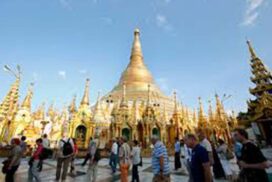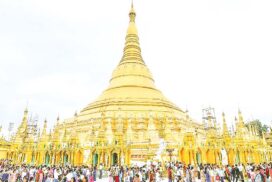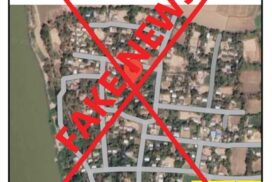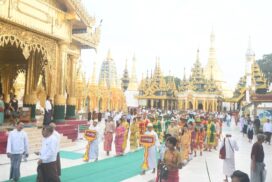The Shwedagon Pagoda has been closed off for more than 10 months since 9 April 2020 during COVID-19 pandemic. The spread of disease reaches under control to a certain extent due to the effective COVID-19 prevention, control and treatment activities. Therefore, the pagoda will be opened to public starting 8 February 2021 in accordance with the words of State Sangha Maha Nayaka Sayadaws, Ovada Sariya Sayadaws of Pagoda Board of Trustees, and permission of the State Administration Council in line with the COVID-19 health rules. But, celebrating occasions with ceremonial gatherings remains restricted.
Pilgrimage programmes for monks, people
1. The pagoda will be opened to monks and nuns on 8.2.2021 and 9.2.2021.
2. The pagoda will be opened for the older people and people with disabilities on 10.2.2021.
3. The pagoda will be opened to public starting 11.2.2021.
4. There will be three pilgrimage sections respectively in the morning and afternoon- from 06:00 am to 07:00 am, 08:00 am to 09:00 am and 10:00 am to 11:00 am and 13:00 pm to 14:00 pm, 15:00 pm to 16:00 pm and 17:00 pm to 18:00 pm. There will be six times for pilgrimage and 500 visitors will be allowed at a time, and a total of 3,000 people can visit per day.
5. A total of 500 people can pay homage to the pagoda per time as it will allow 200 people from the eastern stairway while 150 from the western stairway, 50 from the southern stairway and 100 from the northern stairway.
6. The visitors except for elderly people and people with disabilities must not use the elevator.
7. The pilgrimage hour is 1 hour.
8. The pilgrims will have to fill the Form for personal data (name, father’s name, NRC No, phone number, address). The pilgrims can also take the pre-filled personal data forms.
9. The pilgrims must return from the stairways where they come.
Facts to follow
1. The people with suspected COVID-19 symptoms like fever (temperature over 100.4°F/38°C), cough, difficult breathing and smell loss must not be allowed.
2. The pilgrims must wear masks. The elderly people at the age of over 60 and those having chronic diseases such as diabetes and hypertension must wear masks and face shields.
3. The pilgrims must cooperate in filling personal data, phone numbers in the designated forms and record books.
4. The pilgrims must exactly follow the COVID-19 preventive measures without fail.
5. The people need to wash the hands thoroughly for 20 seconds at the handwashing basins at the entrance of stairways, pagoda platforms and exit ways or use Hand Sanitizer containing 60pc of alcohol before they enter the pagoda compound, or every time after paying homage (the hands touch the floor (or) pagoda platform), and when they return.
6. The people must take mini Hand Sanitizer containing 60pc of alcohol to wash the hands after paying homage (touching the floors or pagoda platforms).
7. The people must take temperature screening conducted by the officials at the stairways with Non-contact thermometer (or) Thermal Scanner.
8. The pilgrims must follow the 6ft social distancing at the entry and exit of stairways and on the pagoda platform.
9. The people must avoid paying homage at the rest house and guest pavilions for a long time, eating food in a group or offering food donation (Satudithar).
10. The people must systematically throw the used masks and tissues to the dustbin with covers.
11. Within 7 days after the visit to the pagodas, if the people suffer from sick, cough, smell loss and hard breathing, they must go the nearest healthcare department.
Pilgrimage programmes for region/state pagodas
1. The pagodas located in regions/states will be opened to public starting 8.2.2021.
2. The pilgrims must follow the COVID-19 prevention, control and treatment instructions of the Ministry of Health and Sports.
3. All the people living in Nay Pyi Taw and other regions/ states must follow the instructions of the Ministry of Health and Sports.
4. The pagoda board of trustees of Nay Pyi Taw and other regions/states must make preparations for 33 facts released by the Ministry of Health and Sports.
5. The relevant pagoda board of trustees must follow the orders and directives of Nay Pyi Taw, Region/State Administration Councils.
Ministry of Religious Affairs and Culture













